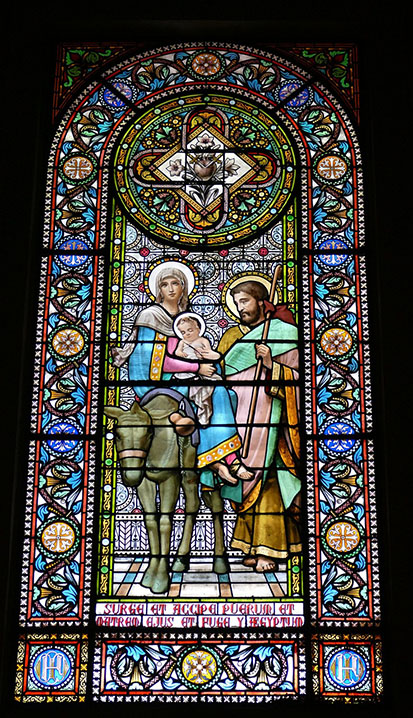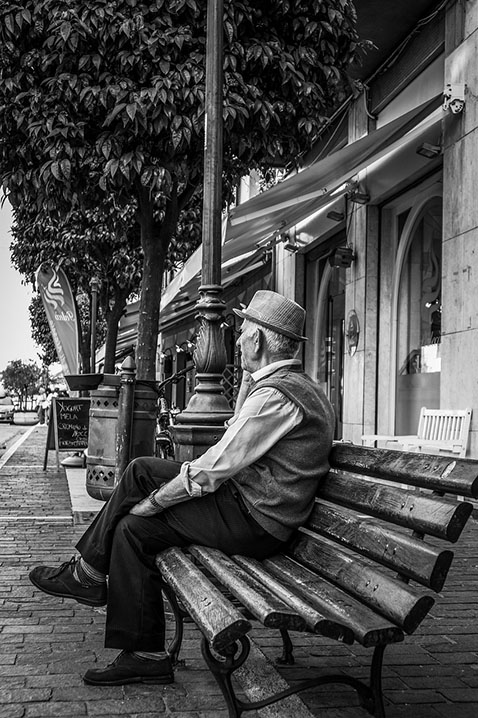
FINDING A HOME
This painting represents the reality of so many people in the world looking for a place to stay, especially as they flock into crowded modern cities, searching for jobs or fleeing from various situations of conflict. The need to create living spaces for them is acute. Like Joseph and Mary, who found no place at the inn, millions of people risk ending up unsheltered in the streets and deprived of a dignified dwelling which they can call home.
Painting by Fr Raul Tabaranza MCCJ
YOUTH VOICES • IDENTITY

GOD: OUR IDENTITY AND HOME
Searching for identity and meaning in life becomes a vital need in our existence. As the author points out, we find our true identity in God while passing through the uncertainties, frustrations and hopes of our lives.
BY JILL WILLIAMS | CANDIDATE LANDSCAPE ARCHITECT, PRETORIA
AT THE close of one year and the begin-ning of another, one is faced with the reality of the past, present and future. Crossing the threshold of a new year is a mixture of bitter-sweet experience. That moment carries both the dark cloud of loss—the memories of many people who did not make it to reach that time, the hopes and dreams for the year that ends which were not materialised. It recalls the not-so-distant past traumas and heartaches that you never imagined could happen. Amidst all this, it also brings a glimmer of hope for what is to come, a sense of gratitude for the gift of life and for another chance at living it.
Then the cycle begins again. I’m sure that we have all experienced it. New Year starts with a certain goal in our minds, which initially looks feasible, and then slowly dies down until it fades completely. In the turbulence of life, we become weary, or even lose our perspective and give up. We ask ourselves: why are you even doing this again? This could even lead to a point of depression or to a nagging feeling of not belonging.
God is the origin of identity, as all things proceed from Him.
Everyone gets lost sometimes. You might feel this way right now. This is when we must remember who we are.
Firm ground
One’s identity acts as a point of reference from which decision-making takes place. It is a solid ground amidst the raging uncertainties and fleeting pleasures of life. It is our home-base. Identity is more than something you are associated with; it is often linked to, or derived from someone you are associated with, such as a club, organisation, cultural group, your parents and family members and, most importantly, God himself.
“Before the mountains were brought forth, or ever you had formed the earth and the world, from everlasting to everlasting you are God” (Psalm 90:2) God is who He is (active present tense)—the safe refuge, strong tower and loving Father— and He welcomes us as adopted sons and daughters. God is the origin of identity, as all things proceed from Him. In the same manner, who we are is found in Him.

Father’s role
In the Bible, the story of Joseph, Mary’s spouse, is very short, yet holds great value in understanding Jesus’s identity in the world into which he was born. One of the roles of a father is to give identity to his child. In a perfect world, the father not only makes a home for his wife, but plans and has purposes for the growth of his family, ensuring that everything that is required for this, is provided for. We recall the beautiful story of the journey that Joseph and Mary had to undertake in order to ensure that their Baby was safe and that he was born in a warm and secure environment. But God, his Divine Father was also with them, guiding them to where they should go, and instructing Joseph through visions and dreams on how to approach that journey. God, being a very present Father, ensured that Jesus’s earthly father could do what he was tasked to do.
In a perfect world, the father not only makes a home for his wife, but plans and has purposes for the growth of his family.
Jesus, being fully God and fully man, was given an earthly father who had the identity of being a son of David, a shepherd and King (who defeated all his enemies). Joseph also belonged to the tribe of Judah as part of his identity—the name of the fourth son of Jacob, one who was described as a lion, and “one who holds the sceptre”, by his father (Genesis 49: 9-10). Joseph himself was a carpenter, a profession which at that time had a vast scope of work from the creation of furniture to buildings and structures (architecture). These are but a few elements of the identity of Joseph; all of them and more were bestowed upon Jesus, (even though he was not Joseph’s biological child) by right of his being born into the family of Joseph.

Jesus’ identity
Jesus is the Lion of the tribe of Judah (Revelation 5:5); the Good Shepherd (John 10: 11-16); King of kings and Lord of lords (1 Timothy 6:15); the One who challenged the Jews to tear down the Temple (his body, when dying) and in three days he would re-build it (in his resurrection) (John 2:18-19); and the Chief Cornerstone “…in whom the whole building, being fitted together, grows into a holy temple in the Lord.”(Ephesians 2:19-22).
Even in naming his son, Joseph was instructed by an angel on what to call him: Jesus (Matthew 1:21)—the Messiah. In this name he is further given the identity of Immanuel (God with us) (Isaiah 7:14), Wonderful Counsellor, Mighty God, Everlasting Father and Prince of Peace (Isaiah 9:6).
God as our heavenly Father, creates, forms into being and ends His creatures’ lifespan at His own time and according to His will. He has knitted this ability into man, whom he created, and has given us the authority to bring these actions about. Jesus could do this and we can too, as we are joint heirs with him (Romans 8:17).



Struggles which manifest our true self
I would imagine that Pi, in the book— turned into movie Life of Pi (Lee, 2012) hoped and prayed to reach the end of his ordeal; having faced the loss of his family to a sinking ship and facing countless near-death experiences on the life raft he was on. Yet, in the end, when he finally reached the shore, he was too scared to leave the boat, lest, after all he had experienced, he would drown in shallow water.
We must believe that what has happened to us in the year that has passed, had to happen, for the growth and development of our understanding of who we are.
He forgot who he was—Piscine Molitor Patel, being named after Piscine Molitor, a famous pool in France. His name became a sign and foretaste of what his life would be impacted by: water. The person he had become after facing all that he had faced in the ocean would have been impossible without going through the water. His character was forged by what he had gone through, helping him realise his true identity: an overcomer. Eventually, he got out of the boat and reached dry land. I believe this is an invitation for us too. We must believe that what has happened to us in the year that has passed, had to happen, for the growth and development of our understanding of who we are.
Like the water on which Pi lived during his journey, this earth—this reality—is not our home. We are sojourners on this earth (1 Chronicles 29:15). Nothing on this earth is permanent, and so every feeling of comfort we may experience is merely temporary. God is everlasting, our ‘dry land’ so-to-speak, and more real than the air we breathe or the reality we are experiencing with our natural being; He longs for us and allows us to experience glimpses of Himself even in these finite things. Our true reality is embedded in our true identity: being sons and daughters of God. In this way, we are called to join in the life, death and resurrection of Jesus. With this we are invited into eternal life, and are given all that we need to live jubilant, fruitful lives now. He is our reality. He is our identity. He is our Home.
References
Lee, A. (Director). (2012). Life of Pi [Motion Picture].

